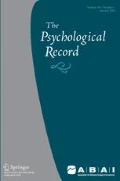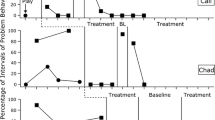Abstract
The experimenters investigated whether dysphoric and nondysphoric persons differentially exhibited the traditional instructioninduced schedule-insensitivity effect (rule-governed behavior). Dysphoric and nondysphoric participants were given instructions to perform a matching-to-sample task (four blocks, 40 trials each). The instructions in the first half of the study were correct and in the second half, incorrect. Participants were assigned to one of two instructional control conditions in which they read the instruction either privately (tracking condition) or out loud to the experimenter (pliance condition). Dysphoric individuals demonstrated greater schedule sensitivity (less rule-governed behavior) than did nondysphoric persons. No other differences were found. Results indicate that deficits in rule-governed behavior may contribute to depression; however, this experiment did not incorporate procedures to directly test the role of rule-governed experiential avoidance.
Similar content being viewed by others
References
BARON, A., KAUFMAN, A., & STAUBER, K. A. (1969). Effects of instructions and reinforcement-feedback on human operant behavior maintained by fixed-interval reinforcement. Journal of the Experimental Analysis of Behavior, 12, 701–712.
BECK, A. T., WARD, C. H., MENDELSOHN, M., MOCK, J., & ERBAUGH, J. (1961). An inventory for measuring depression. Archives of General Psychiatry, 4, 561–571.
CATANIA, A. C., MATTHEWS, B. A., & SHIMOFF, E. (1982). Instructed versus shaped human verbal behavior: Interactions with non-verbal responding. Journal of the Experimental Analysis of Behavior, 38, 233–248.
GAYNOR, S. T., THOMAS, A. P., & LAWRENCE, P. S. (1999). Dysphoric mood and preference for immediate versus delayed monetary reinforcement. Psychological Reports, 84, 1281–1293.
HAYES, S. C., BROWNSTEIN, A. J., ZETTLE, R. D., ROSENFARB, I., & KORN, Z. (1986). Rule-governed behavior and sensitivity to changing consequences of responding. Journal of the Experimental Analysis of Behavior, 45, 237–256.
HAYES, S. C., STROSAHL, K. D., & WILSON K. G. (1999). Acceptance and commitment therapy: An experiential approach to behavior change. New York: Guilford Press.
HAYES, S. C., WILSON, K. G., GIFFORD, E. V., FOLLETTE, V. M., & STROSAHL, K. D. (1996). Experiential avoidance and behavioral disorders: A functional dimensional approach to diagnosis and treatment. Journal of Consulting and Clinical Psychology, 64, 1152–1168.
HAYES, S. C., ZETTLE, R. D., & ROSENFARB, I. (1989). Rule-following. In S. C. Hayes (Ed.), Rule-governed behavior: Cognition, contingencies, and instructional control (pp. 191–220). New York: Plenum Press.
KAUFMAN, A., BARON, A., & KOPP, R. E. (1966). Some effects of instructions on human operant behavior. Psychonomic Monograph Supplements, 1, 243–250.
LIPPMAN, L. G., & MEYER, M. E. (1967). Fixed interval performance as related to instructions and to subjects’ verbalizations of the contingency. Psychonomic Science, 8, 135–136.
MCAULIFFE, D. (2004). Rule-following and depressive symtomology in an adolescent population. Unpublished doctoral dissertation, National University of Ireland-Maynooth, Co., Kildare.
POPPEN, R. L. (1989). Some clinical implications of rule-governed behavior. In S. C. Hayes (Ed.), Rule-governed behavior: Cognition, contingencies, and instructional control (pp. 325–357). New York: Plenum Press.
REHM, L. P. (1979). A comparison of self-control and assertion skills treatments of depression. Behavior Therapy, 10, 429–442.
REHM, L. P. (1989). Behavioral models of anxiety and depression. In P. C. Kendall & D. Watson (Eds.), Anxiety and depression: Distinctive and overlapping features (pp. 55–79). San Diego: Academic Press.
REHM, L. P., & PLAKOSH, P. (1975). Preference for immediate reinforcement in depression. Journal of Behavior Therapy and Experimental Psychiatry 6, 101–103.
REHM, L. P., & ROKKE, P. (1988). Self management therapies. In K. S. Dobson (Ed.), Handbook of cognitive-behavioral therapies (pp. 136–166). New York: Guilford Press.
ROSENFARB I. S., BURKER, E. J., MORRIS, S. A., & CUSH, D. T. (1993). Effects of changing contingencies on the behavior of depressed and nondepressed individuals. Journal of Abnormal Psychology, 102, 642–646.
RUSH, A. J., GILES, D. E., SCHLESSER, M. A., FULTON, C. L., WEISSENBURGER, J., & BURNS, C. (1986). The Inventory for Depressive Symptomatology (Ids): Preliminary findings. Psychiatry Research, 18, 65–87.
SHIMOFF, E., CATANIA, A. C., & MATTHEWS, B. A. (1981). Uninstructed human responding: Sensitivity of low-rate performance to schedule contingencies. Journal of the Experimental Analysis of Behavior, 36, 207–220.
SKINNER, B. F. (1953). Science and human behavior. New York: Macmillan.
SKINNER, B. F. (1969). Contingencies of reinforcement. New York: Appleton-Century-Crofts.
WEINER, H. (1970). Human behavioral persistence. The Psychological Record, 20, 445–456.
ZETTLE, R. D., & HAYES, S. C. (1982). Rule-governed behavior: A potential theoretical framework for cognitive-behavioral therapy. In P. C. Kendall (Ed.), Advances in cognitive-behavioral research and therapy (73–118). New York: Academic Press.
ZETTLE, R. D., & HAYES, S. C. (1983). Effect of social context on the impact of coping self-statements. Psychological Reports, 52, 391–401.
Author information
Authors and Affiliations
Corresponding author
Rights and permissions
About this article
Cite this article
Baruch, D.E., Kanter, J.W., Busch, A.M. et al. The Differential Effect of Instructions on Dysphoric and Nondysphoric Persons. Psychol Rec 57, 543–554 (2007). https://doi.org/10.1007/BF03395594
Published:
Issue Date:
DOI: https://doi.org/10.1007/BF03395594




